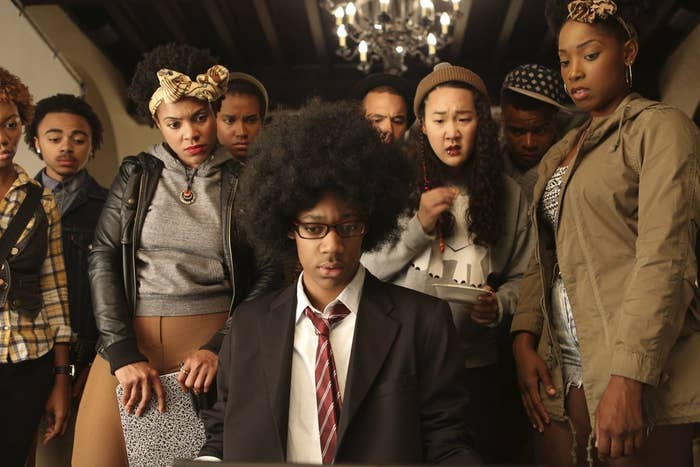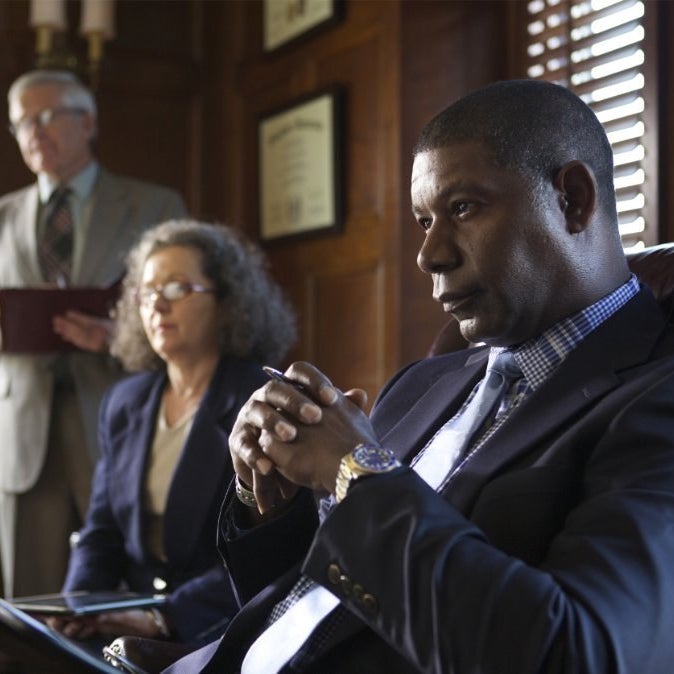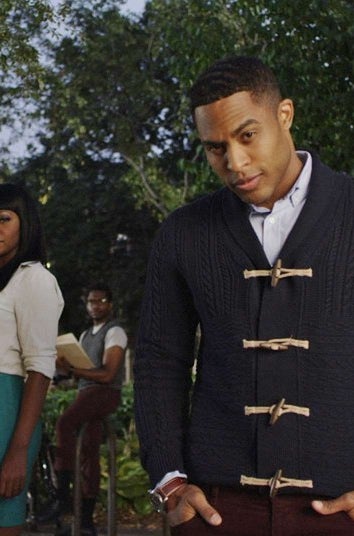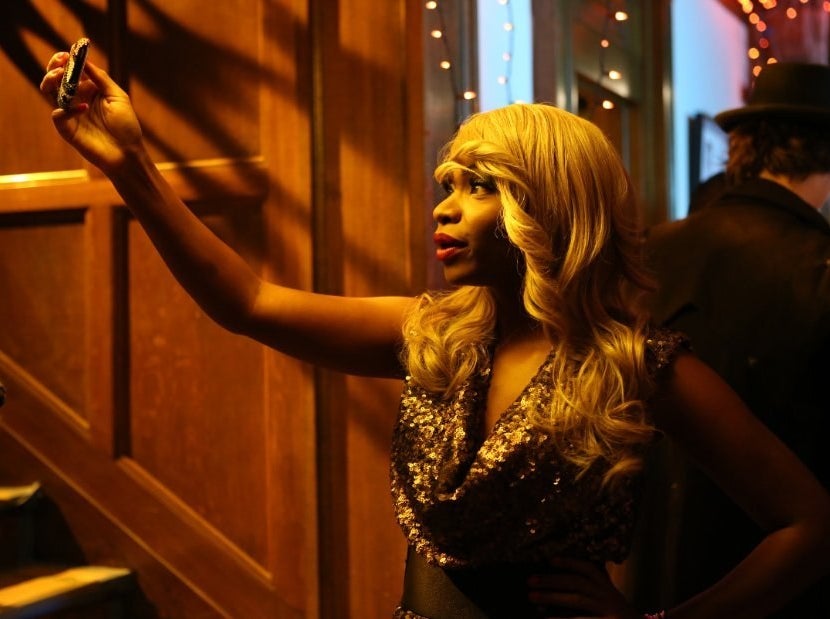
The greatest throwaway line in Dear White People? It might just be the hilarious summary that Sam White (Tessa Thompson), the movie's incendiary race warrior, offers her professor of her "15-page unsolicited treatise on why the Gremlins is actually about suburban white fear of black culture."
"The gremlins are loud, talk in slang, are addicted to fried chicken, and freak out when you get their hair wet," she points out.
Dear White People, which is now open in limited release, may be filled with razor-edged quips like that, but it's so much more than just a clever comedy. Set in a tony, mostly white private college where a group of students decides to throw a "black-themed" party (there's little fiction needed in that plot development), it's an electrifyingly zeitgeisty depiction of a "post-racial" America where tensions and ignorance haven't actually miraculously disappeared. It's also a nuanced portrayal of how the typical collegiate search for identity intersects with the experience of being one of the few people of color in the room.
The movie premiered at the Sundance Film Festival in January, but feels even more timely after a year that's included events as major as Ferguson and as recent as the unveiling of The Whiteness Project. And the themes it tackles are ones that writer/director Justin Simien has been considering for much longer than that. The first-time filmmaker traces the germination of Dear White People back to his own experiences at Chapman University in Orange County, where he found himself in an environment that was considerably less diverse than the Houston performing arts high school from which he'd come. "I felt very free to be myself in my high school," he told BuzzFeed News. "In college... I didn't quite feel that way."

Simien, who is now based in Los Angeles, would have long conversations with his friends about "how we live in a world where everyone thinks that we're over racism, but we are feeling it and sensing it in our everyday lives." It was his yearning to put that reality on screen, to make a movie about the "American experience through a black lens," that led to Dear White People, as well as his desire to make something in the tradition of the late '80s and early '90s black films he loves, from Do The Right Thing and Hollywood Shuffle to Love Jones.
Dear White People splits its focus between four different characters that Simien described as "rounding out the possibilities of being a person of color and trying to reach your potential in a society where you're not necessarily reflected." There's Sam, the biracial film student and Black Student Union leader who runs the provocative radio show of the title ("Dear white people: the amount of black friends required not to seem racist has just been raised to two — sorry, your weed man, Tyrone, doesn't count.") and whose genuine frustration and passion has led her to commit to an image she can't always live up to. There's Troy (Brandon P Bell), the son of the dean (Dennis Haysbert) and, as Simien put it, "the representative black man, the Theo Huxtable of the group," who is struggling under the pressure to maintain his perfect image.
The always immaculate, class-sensitive Coco (Teyonah Parris) — full name Colandrea — openly aspires to find herself "a Gosling" as a boyfriend, and resents being automatically grouped into the historically black residence hall and feeling like her race has predetermined how she's perceived. And Lionel (Tyler James Williams), who, like Simien, is openly gay, doesn't feel like he fits in anywhere — he's shy and loves Robert Altman and Mumford & Sons, and tells the dean that it's the other black kids who were the worst to him in high school. Lionel lives, miserably, in the house ruled over by Kurt (Kyle Gallner), the bratty son of the university's president and head of its Harvard Lampoon-esque humor magazine, and the one who comes up with the idea for the offensive party.


A title like Dear White People is bound to provoke — it's already attracted a few knee-jerk angry IMDb reviews from people who clearly haven't even seen it. Simien has gotten used to that type of response over his time getting the film made, a process that included experimenting with what became Sam's voice on Twitter and shooting a concept trailer two years ago that went viral and helped fuel a successful crowdfunding campaign. "Not all white people, but some white people, particularly the ones in the YouTube comments section, there's a full stop at the title of our movie: 'Oh my god, reverse racism!'" he said. "There's a reticence to wake up to their own white privilege."
Simien doesn't see his movie as being about racism. The people he depicts would never think of themselves as racist, even as a school newspaper colleague digs her fingers into Lionel's hair ("You don't mind, do you?"), even as Troy's preppy white girlfriend (Brittany Curran) awkwardly peppers her conversation with black slang, as Kurt announces that he fully believes that these days, the hardest thing to be is "an educated white man." "This reticence to look outside the bubble — that's the thing that's troublesome," Simien said. "You have to recognize that as a white person, you get things that some people don't get — and it doesn't make you bad, but it makes you aware of the experiences of others."
"In a nation that is increasingly more diverse, you're at a handicap the more you refuse to see the world through other people's points of views," he added. "The truth is, for white people who venture into this movie, you find out that it's actually not this attack. And the funny thing is, 'Dear White People,' just those words alone aren't necessarily aggressive. It's the assumption. There's a lot that goes into that actually has nothing to do with me, and nothing to do with the movie."


Dear White People doesn't let its black characters off the hook, either — it digs into the external identities they've wrestled themselves into versus their private selves, revealing them all to be more complicated and conflicted than they first appear. Troy juggles joke-writing aspirations and hides his pot smoking with toilet paper rolls and dryer sheets, while Sam keeps her white fuckbuddy at arm's length because he's not the kind of guy she thinks she should be seen dating.
Coco plays up her blackness in order to be a more appealing candidate for a reality show that's scouting on campus, and Lionel lets himself be used as the token reporter of color by the editor of the school paper, who wants a story on Sam. And they all deal with being seen through the limiting external ideas of what constitutes "black culture."
"It does suck for people of color, the pressure to find a label, but we live in a world where identity is currency, and communities are very important," Simien said. "Believing that you are the label is the mistake."
It's something Simien deals with himself. "Being a 'black filmmaker,' going on a press tour, you have to allow for the box because that allows us to be here. Sure, if we have to talk about comparisons to Spike Lee or Tyler Perry, so be it, because at least we're here in the room." While Dear White People definitely evokes Lee at points (and has some scathing things to say about Perry), it draws just as much from Wes Anderson in its stylized introduction to the fictional Winchester University, and Simien cites Fritz Lang's 1927 Metropolis as a movie his frequently visually references. It's Stanley Kubrick whom Simien describes as his "first true film love." The self-described film geek says his heroes are the directors "who dared to make movies with their own specific voices, points of views, didn't have a ton of fucks to give when it came to the critical reception."

Fucks given about it or not, the critical reception to Dear White People has been glowing, and Simien is hoping to use the momentum to make a TV series based on the film that would allow for room for the many other characters he conceived of but didn't have room for in the movie. He's also got a Dear White People book, subtitled "A Guide To Inter-racial Harmony In 'Post-Racial' America," coming out at the end of this month, and he's writing a new feature.
And at 31, Simien is happy to feel "a little more integrated" as a person, and to have a more comfortable sense of who he is, than his still-searching characters — though he says that at different points he's identified most with each of the main four. "I don't feel the need to separate the different versions of myself as I think I felt the pressure to, certainly, in my twenties and growing up."
"I feel like I'm all of them, given the right situation," he added. "I don't feel conflicted about that anymore."
